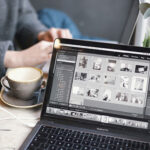Like with any other type of photography, the backdrop of your image plays a crucial role when photographing food. Besides adding aesthetic value, the background also helps to draw attention to the food and highlight any specialties. This is why you’ll find professional food photographers investing a good deal in to finding the perfect backdrop. But what if you’re not able to find the perfect backdrop for your food photography? Well, there’s always the option to make one on your own. Today we have professional food photographer Joanie Simon who shares some tips on crafting custom backdrops for food photography:
What Simon shares in this video is particularly interesting because of two main reasons. First, you do not require any sort of materials like a drill, screws, or nails to put the backdrop together. And second, you can use both sides of the backdrop to give an entirely different look and feel to your images just by flipping the backdrop over.
An important thing to keep in mind is to be sure to pick the right wood. And by right, we don’t mean anything fancy. Just get something that’s perfectly straight. This ensures a perfect fit once it is cut. Simon suggests that you cut (or have it cut) into 3ft planks for optimally sized backdrops.
The trick that she uses to fix the wooden planks together is to use wood glue instead of any nails or screws. Apply the glue evenly and leave it to dry for 24hrs and you will be surprised to see how well the planks hold together. Using wood glue makes for even finish, allowing you to use it on the reverse side as well.
Once dried, feel free to get creative and paint with the color of your choice or requirement. Alternatively, you can opt for wood stain if you prefer. Whatever you use, be sure to wait for at least another 24hrs to let the it set.
Complete these steps and your board for your backdrop will be ready. But, in the case of food photography, a freshly painted pristine backdrop might appear boring. Thus, Simon demonstrates a couple of tricks that you can use to make it appear as if the board is an old one. Use a wire brush, slap some chains onto the board, or poke it with some metal. Feel free to experiment and get creative with this step and you will be surprised to see what you end up with.
“There is a lot of fun, flexibility, and creativity you can apply. There is no right and wrong. Experimentation can really pay off.”
Once you’re done with one side, let your creativity go wild with the other side of the plank too. You’ll then have a handy backdrop that is equally good when used on either side.
Like This Article?
Don't Miss The Next One!
Join over 100,000 photographers of all experience levels who receive our free photography tips and articles to stay current:




Leave a Reply